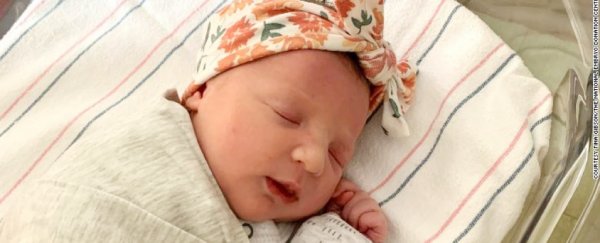A baby born in Tennessee can lay claim to being the oldest baby ever born, in that she is believed to be the longest-frozen embryo ever successfully delivered in a live birth.
Molly Everette Gibson was born on October 26, but her birthday was an event literally decades in the making. She was born from an embryo frozen in October 1992 – a mind-boggling 28 years ago.
And effectively a lifetime ago, too. Molly's mother, Tina, is now 29, and was herself only born about 18 months earlier than when Molly was frozen in her embryonic form.
In a manner of speaking, they've both been on this planet for about the same amount of time, even though they're a generation apart.
"It's hard to wrap your head around it," Tina Gibson told the New York Post. "But, as far as we're concerned, Molly is our little miracle."
The incredible strangeness of this story gets even stranger.
When Molly was born, she broke the record held by another child who was previously the longest-frozen embryo ever delivered. That child – Emma Wren Gibson – was frozen as an embryo for 24 years before being born in 2017.
Emma also happens to be Molly's older sister, meaning this single family's two children were the two longest-frozen embryos ever to be born.
That might sound weird – as if the Gibson family, who previously struggled with infertility for several years, were vying for a spot in the Guinness World Records – but it makes perfect sense when you know the entire story.
Molly and Emma are full genetic siblings that were frozen at the same time, after being anonymously donated by their biological parents, whose identity has not been disclosed.
In other words, the two sisters are actual sisters – in addition to being adopted sisters – who were both carried and delivered by their adoptive mother, Tina.
It's just that it took a little longer than usual, decades in fact, for these patient little ones to have their time in the sun.
"We're over the moon," Tina Gibson told the BBC.
"I still get choked up. If you would have asked me five years ago if I would have not just one girl, but two, I would have said you were crazy."
The births were facilitated by staff at the National Embryo Donation Centre (NEDC), in Knoxville, a Christian-based nonprofit that receives donated embryos from biological parents who have gone through in vitro fertilisation (IVF), but who have decided, for whatever reason, not to go through with using the embryo for a pregnancy.
In such cases, rather than letting the embryos be discarded, the parents can donate their frozen embryos to the NEDC, which stores them for later use, working with would-be parents (most of them with infertility), who apply to adopt, carry, and deliver an embryo.
The centre has facilitated over 1,000 successful deliveries, but Emma and Molly represent the most scientifically remarkable cases, in that they are the longest-frozen embryos ever to become babies.
Beyond the novelty of their record-breaking status, their successful births are providing unique proof of how long frozen embryos can actually last, which has never been fully understood.
"As long as the embryos are maintained correctly in the liquid nitrogen storage tank at minus 396 degrees, we feel they may be good indefinitely," NEDC lab director Carol Sommerfelt told the New York Post.
"With the birth of Molly, we know they can survive at least 27 and a half years and probably longer."
While Molly and Emma are testament to the possibilities, there is still much risk and uncertainty in the process.
About 75 percent of donated embryos survive the freezing and thawing process, the NEDC says, and about 49 percent of transfers result in a live birth.
Fortunately, IVF success rates with frozen embryos have caught up in recent years, and are now thought to be about as successful as treatments using fresh embryos.
For the embryos that make it to birth, a loving family awaits. For some, like Molly and Emma – born whole decades after nature otherwise intended – there's that and more.
When going through the process the first time, Tina Gibson only found out on the day of the transfer that the embryo she would be receiving had been frozen since about the time of her own birth.
"What does that mean?" she asked the specialist. He replied. "Well, it could be a world record."
